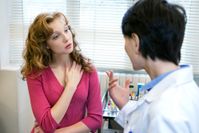3 Things to Know About Cervical Cancer Prevention

Cervical cancer affects more than 13,000 women in the U.S. annually, with over 4,000 of those resulting in death. While it’s a prominent women’s health concern, it’s possible to significantly reduce your risk of getting cervical cancer and help other girls and women in your life do the same. Here are three things gynecologists want you to know about cervical health.
How to Practice Cervical Cancer Prevention
1. Get a Pap Smear
As a rule of thumb, women should get their first Pap smear before age 21 and every three years afterward until age 65. Women over 30 may get it every five years if the test is combined with an HPV test. If you have a history of abnormal Pap results or HPV, your doctor will likely recommend more frequent tests. The Pap test involves taking a sample of cervical cells to see if any are precancerous. Not all precancerous cells become cancer, and the transition from benign to cancerous typically takes 10 years or more. Your doctor will determine how far they have progressed and weigh other factors to determine if they should be removed immediately or if you should have subsequent exams over a period of months or years to monitor changes.
2. Get an HPV Test
 Although the HPV test and a Pap test can be administered concurrently, they’re not the same. The HPV test tests explicitly for the presence of human papillomavirus, the leading cause of cervical cancer. The virus, which is a sexually-transmitted infection, can also lead to genital warts. It’s extremely common, affecting sexually active people of all ages and sexual orientations. There are many strains of HPV, some of which cause cancer and some of which don’t. Men can contract and pass it to their partners, so it’s important to practice safe sex. Most infections clear on their own in a year or two.
Although the HPV test and a Pap test can be administered concurrently, they’re not the same. The HPV test tests explicitly for the presence of human papillomavirus, the leading cause of cervical cancer. The virus, which is a sexually-transmitted infection, can also lead to genital warts. It’s extremely common, affecting sexually active people of all ages and sexual orientations. There are many strains of HPV, some of which cause cancer and some of which don’t. Men can contract and pass it to their partners, so it’s important to practice safe sex. Most infections clear on their own in a year or two.
3. Get an HPV Vaccine
The HPV vaccine is the most effective form of protection against HPV, aside from abstinence. Gynecologists recommend girls get their first dose between the ages of 11 and 12, though it is also recommended for girls and women ages 13 to 26. The vaccine is given in three doses, with each dose administered about six months after the previous. It protects against four strains, the two most common high-risk and two most common low-risk varieties.
Start your year off on a healthy note with a visit to your gynecologist. If you’re an Oswego County, NY, resident, turn to the women’s health professionals at Oswego County OB-GYN PC for comprehensive care you can trust. From Pap tests to HPV tests, and birth control to breast exams, they offer a range of services to help you live your healthiest life. Call (315) 343-2590 to schedule an appointment or visit the website to learn more about women’s health.
About the Business
Have a question? Ask the experts!
Send your question

